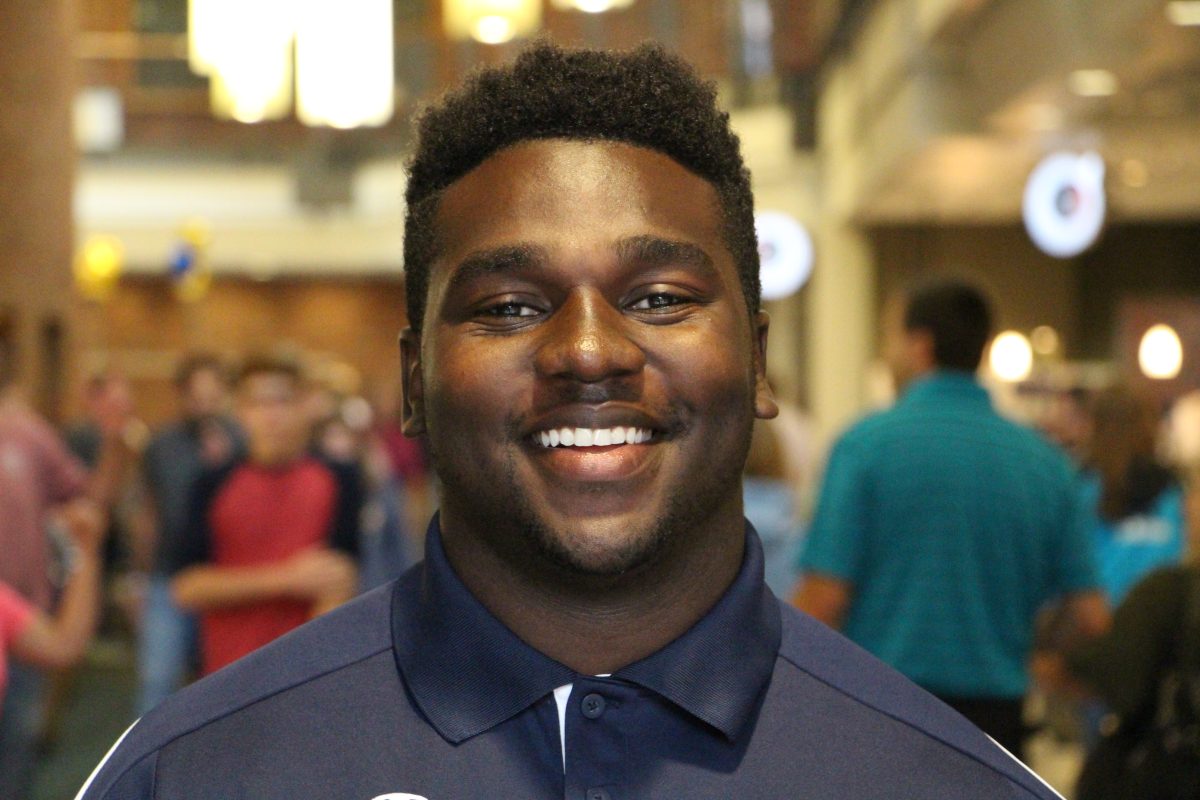The following is an opinion piece and does not necessarily reflect the views of The Clarion, its staff or the institution. If you would like to submit a response or an opinion piece of your own, please contact [email protected].
Godfrey Mpetey examines the importance of rhetoric and how it not only shapes what we believe, but how we address it towards others.
By Godfrey Mpetey
Engaging with those who hold different perspectives as I do is an attribute I pride myself on. I can play devil’s advocate. I strive to be able to step into the footsteps of others. It’s essential in navigating our interactions, not only at Bethel University but in the world surrounding our enclosed campus.
Reflecting on tendencies throughout conversations, I’ve noticed the power of our rhetoric. For example, as a prominent player for Bethel Royals football, I hold the power to separate the locker room. As our season began with an 0-3 start, I could storm into the locker room, furiously telling my teammates: “you all suck!”
But as Uncle Ben told Peter Parker, “With great power, comes great responsibility.” We hold great power in what we believe and say.
Each individual holds power in their rhetoric. It’s important how one uses their power and understands from where their perspective stems. While everyone holds power in their rhetoric, certain groups hold greater power than others.
Illegal immigration comes to mind when I think about those whose voices are clouded by dominant rhetoric. This rhetoric of building walls and labeling people is the dominant group’s way of shifting the narrative. Rarely do we recognize how our rhetoric translates into our beliefs, which can dehumanize those who are vulnerable in society.
A recent illustration of comes from President Donald Trump, who made remarks about NFL players kneeling during the national anthem. Trump posted on his infamous Twitter account to motivate NFL owners to fire their players for participating in peaceful protests to symbolize systematic injustices towards African Americans.
Trump, with the highest platform on Earth, chose to utilize his rhetoric as Commander in Chief to motivate NFL owners to “get that son of a b**** off the field.” This incident sparked nationwide debate and drama while Puerto Rico sits submerged awaiting aid after record-setting Hurricane Maria ravaged through the country.
Trump’s speech exemplifies the importance of using proper rhetoric in positions of power. He understood his crowd – an arguably conservative rally in the middle of Alabama, a red state that could put St. John’s University to shame. Once again, Trump summoned his white privilege and spread his divisive rhetoric as rapid as California wildfires.
While each individual has power of rhetoric, some are held higher than others. Trump denouncing the actions of NFL players aims to preserve the narrative that those who oppose his beliefs are the enemies. More importantly, he has generated rhetoric that divides.
The rhetoric in my writing may be seen as divisive as Trump’s, but my perspective resembles those who are powerless. As a columnist for the Clarion, I’m presented with an opportunity to elevate the voices of the powerless and use my rhetoric to encourage discussion.
Moving forward, I wish to wrestle internally with how I choose to use my rhetoric and how I can use it to build bridges rather than burn them. I challenge our university to evaluate themselves and ponder what their rhetoric seeks to do – sustain the dominant rhetoric or magnify the voices of the powerless.

![Nelson Hall Resident Director Kendall Engelke Davis looks over to see what Resident Assistant Chloe Smith paints. For her weekly 8 p.m. staff development meeting in Nelson Shack April 16, Engelke Davis held a watercolor event to relieve stress. “It’s a unique opportunity to get to really invest and be in [RAs’] lives,” Engelke Davis said, “which I consider such a privilege.”](https://thebuclarion.com/wp-content/uploads/2024/05/041624_KendallEngelkeDavis_Holland_05-1200x800.jpg)
















Sharon Sayler • Oct 23, 2017 at 9:18 am
You provide a great example of using rhetoric to insight and anger, was that your point?? “Trump’s speech exemplifies the importance of using proper rhetoric in positions of power. He understood his crowd – an arguably conservative rally in the middle of Alabama, a red state that could put St. John’s University to shame. Once again, Trump summoned his white privilege and spread his divisive rhetoric as rapid as California wildfires.” Sure didn’t “build any bridges” here by once again insulting the President and this “conservative red” follower of Jesus Christ:(